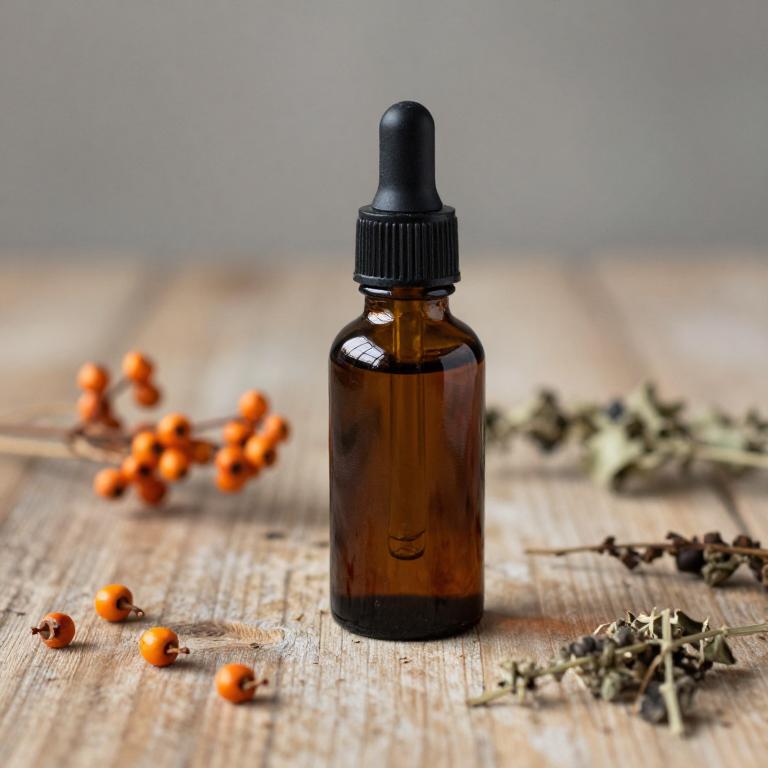10 Best Herbal Tinctures For Congestive Heart Failure

Herbal tinctures are concentrated liquid extracts made from dried herbs, often used as complementary therapies for various health conditions, including congestive heart failure.
While some herbs, such as hawthorn, have shown potential in improving cardiac function and reducing symptoms, they should not replace conventional medical treatment. These tinctures may help support cardiovascular health by acting as antioxidants, improving blood flow, and reducing oxidative stress. However, their efficacy and safety can vary, and they may interact with prescription medications, so consultation with a healthcare provider is essential.
Due to the lack of standardized dosing and regulation, caution is advised when using herbal tinctures for managing congestive heart failure.
Table of Contents
- 1. Thistle (Silybum marianum)
- 2. Stinging nettle (Urtica dioica)
- 3. Salvia (Salvia officinalis)
- 4. Panax ginseng (Panax ginseng)
- 5. Ginkgo (Ginkgo biloba)
- 6. Common hawthorn (Crataegus oxyacantha)
- 7. St. john's wort (Hypericum perforatum)
- 8. White water lily (Nymphaea alba)
- 9. Common grape (Vitis vinifera)
- 10. Turmeric (Curcuma longa)
1. Thistle (Silybum marianum)

Silybum marianum, commonly known as milk thistle, has been traditionally used for its potential hepatoprotective properties, but recent research suggests it may also offer benefits for individuals with congestive heart failure.
The active compound, silymarin, is believed to exert antioxidant, anti-inflammatory, and cardioprotective effects that may support heart function and reduce oxidative stress. Herbal tinctures derived from Silybum marianum are often used as complementary therapy to support overall cardiovascular health, though they should not replace prescribed medical treatments. Some studies indicate that silymarin may help improve left ventricular function and reduce markers of cardiac damage in patients with heart failure.
However, more clinical trials are needed to fully establish its efficacy and safety in treating congestive heart failure.
2. Stinging nettle (Urtica dioica)

Urtica dioica, commonly known as stinging nettle, has been explored for its potential therapeutic benefits in various health conditions, including congestive heart failure.
Herbal tinctures made from Urtica dioica are believed to support cardiovascular health due to their high concentration of minerals such as iron, magnesium, and potassium, which are essential for proper heart function. Some studies suggest that the plant's anti-inflammatory and antioxidant properties may help reduce oxidative stress and improve circulation, which are beneficial in managing heart failure symptoms. However, it is important to note that while preliminary research is promising, there is limited clinical evidence supporting the efficacy of Urtica dioica tinctures specifically for congestive heart failure.
As with any herbal remedy, it should be used under the guidance of a healthcare professional, especially for individuals with pre-existing heart conditions.
3. Salvia (Salvia officinalis)

Salvia officinalis, commonly known as sage, has been traditionally used in herbal medicine for its potential cardiovascular benefits.
While there is limited scientific evidence directly supporting the use of sage tinctures for congestive heart failure, some studies suggest that its antioxidant and anti-inflammatory properties may support overall heart health. Sage tinctures are often prepared using alcohol as a solvent to extract the plant's active compounds, which may include flavonoids and phenolic acids. However, it is important to note that sage should not be used as a substitute for conventional medical treatments for congestive heart failure.
Always consult a healthcare provider before incorporating any herbal remedy into a treatment plan for a serious condition like heart failure.
4. Panax ginseng (Panax ginseng)

Panax ginseng herbal tinctures have been traditionally used in Chinese medicine for their purported ability to enhance energy, reduce stress, and improve overall cardiovascular health.
While some studies suggest that Panax ginseng may have mild cardiovascular benefits, such as improving blood flow and reducing oxidative stress, its role in the treatment of congestive heart failure remains inconclusive. Current scientific evidence does not strongly support the use of Panax ginseng tinctures as a primary or adjunct therapy for congestive heart failure, and more rigorous clinical trials are needed to determine its efficacy and safety in this context. It is important for patients with heart failure to consult with healthcare professionals before using any herbal supplements, as they may interact with prescribed medications or exacerbate existing conditions.
Despite its popularity as a natural remedy, Panax ginseng should not replace conventional medical treatments for congestive heart failure.
5. Ginkgo (Ginkgo biloba)

Ginkgo biloba herbal tinctures are derived from the leaves of the ancient ginkgo tree and are traditionally used for their potential cognitive and circulatory benefits.
While some studies suggest that ginkgo biloba may improve blood flow and reduce oxidative stress, its efficacy in treating congestive heart failure remains inconclusive. The herb is believed to enhance vascular function by dilating blood vessels and increasing oxygen delivery to tissues, which could theoretically support heart health. However, there is limited clinical evidence specifically linking ginkgo biloba tinctures to improved outcomes in patients with congestive heart failure.
Due to the lack of robust research and potential interactions with cardiac medications, it is advisable to consult a healthcare provider before using ginkgo biloba as a complementary therapy for heart conditions.
6. Common hawthorn (Crataegus oxyacantha)

Crataegus oxyacantha, commonly known as hawthorn, has been traditionally used in herbal medicine for its cardiovascular benefits, including its potential role in managing congestive heart failure.
The tinctures derived from its dried flowers, leaves, and berries are rich in flavonoids and oligomeric proanthocyanidins, which are believed to support heart function by improving blood flow and reducing oxidative stress. Clinical studies suggest that hawthorn tinctures may help alleviate symptoms such as shortness of breath and fatigue in patients with mild to moderate congestive heart failure. However, it is important to note that while some research supports its use as a complementary therapy, it should not replace conventional medical treatments and should be used under the guidance of a healthcare professional.
Always consult with a physician before incorporating hawthorn tinctures into a treatment regimen for heart failure.
7. St. john's wort (Hypericum perforatum)

Hypericum perforatum, commonly known as St. John's Wort, is a herbal plant traditionally used for its antidepressant properties, but recent research suggests it may also have potential benefits for cardiovascular health.
While it is not a substitute for standard medical treatments for congestive heart failure (CHF), some studies indicate that its anti-inflammatory and antioxidant compounds may help reduce oxidative stress and improve heart function. However, due to its interactions with numerous medications, including those used in CHF management, its use should be approached with caution and under the guidance of a healthcare professional. Tinctures made from Hypericum perforatum are often used in complementary therapies, but they are not recommended as a primary treatment for congestive heart failure.
Always consult with a qualified practitioner before incorporating any herbal supplements into a treatment plan for CHF.
8. White water lily (Nymphaea alba)

Nymphaea alba, commonly known as the white water lily, has been traditionally used in herbal medicine for its potential cardiovascular benefits.
Herbal tinctures made from Nymphaea alba are believed to support heart function by improving circulation and reducing fluid retention, which are critical in managing congestive heart failure. These tinctures may help alleviate symptoms such as shortness of breath and edema by promoting the elimination of excess fluids from the body. While some preliminary studies suggest possible benefits, more clinical research is needed to fully understand their efficacy and safety in treating heart failure.
As with any herbal remedy, it is important to consult a healthcare professional before using Nymphaea alba tinctures, especially for individuals with existing heart conditions.
9. Common grape (Vitis vinifera)

Vitis vinifera, commonly known as the grape vine, has been traditionally used in herbal medicine for its potential cardiovascular benefits.
Herbal tinctures derived from Vitis vinifera are often prepared using the leaves, seeds, or berries and are believed to support heart health through their antioxidant and anti-inflammatory properties. Some studies suggest that these tinctures may help improve blood flow and reduce oxidative stress, which are important factors in managing congestive heart failure. However, it is important to note that while preliminary research is promising, these tinctures should not replace conventional medical treatments for congestive heart failure.
Always consult a healthcare professional before using any herbal remedy, especially for individuals with pre-existing heart conditions.
10. Turmeric (Curcuma longa)

Curcuma longa, commonly known as turmeric, contains curcumin, a compound with potent anti-inflammatory and antioxidant properties.
While curcumin has been studied for its potential benefits in various health conditions, its role in treating congestive heart failure (CHF) remains under investigation. Some preliminary research suggests that curcumin may help reduce oxidative stress and inflammation, which are often associated with the progression of CHF. However, there is currently insufficient evidence to recommend curcuma longa tinctures as a primary or complementary treatment for CHF.
It is important for patients to consult with healthcare professionals before using any herbal supplements, as they may interact with medications or have adverse effects.